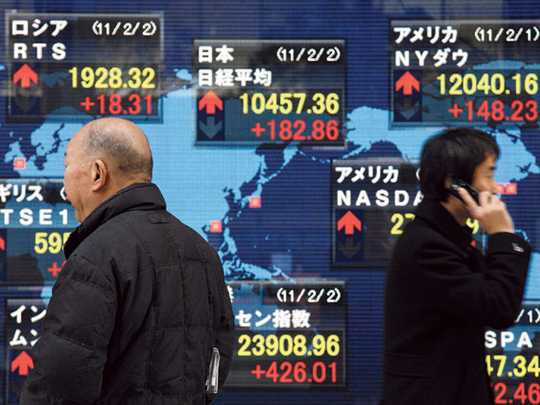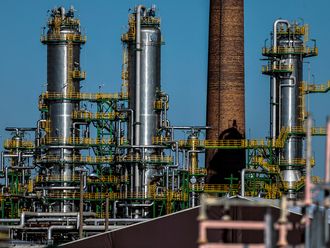
London: World stocks punched fresh 29-month highs yesterday, lifted by strong data pointing to sustained global economic recovery, continuing positive corporate earnings and easing concerns about Egypt.
Wall Street opened slightly higher after a day of good gains on Tuesday. However, a strong reading on the labour market failed to extend gains a day after the Dow and S&P reached their highest close in about 2.5 years.
Investors kept an eye on the massive protests in Egypt as clashes erupted. Concerns that protests would spread throughout the region have pressured equities in recent sessions.
Oil prices fell back from 28-month highs, but Brent crude was still more than $101 (Dh370.91) a barrel on worries that unrest in Egypt could trigger changes to the status quo elsewhere in the Middle East and North Africa.
The dollar fell to three-month lows against a basket of major currencies before recovering slightly.
MSCI's all-country world stock index, one of the broadest gauges of global equities, was up 0.4 per cent after earlier hitting levels last seen in August 2008.
Its developed market counterpart gained 0.3 per cent, close to a high last seen in early September 2008.
Emerging markets were up 0.6 per cent on the day, but remained down more than one per cent for the year, reflecting a recent shift by investors from emerging to developed markets.
Stock investors were cheered on Tuesday by strong factory data worldwide, which pushed US benchmark stock indexes to their highest closing levels since June 2008.
Strong earnings from delivery firm UPS and drugmaker Pfizer in the US on Tuesday, and Imperial Tobacco yesterday added to the mood.
"The world economy appears to be improving a little faster than expected, valuations are okay and companies are publishing quite good results," Geert Ruysschaert, strategist at BNP Paribas Fortis Private Banking, said.
"So investors can take advantage of that."
The pan-European FTSEurofirst 300 was up 0.1 per cent, off its highs but at a 3.5 per cent year-to-date gain. Earlier, Japan's benchmark Nikkei ended up 1.8 per cent for its biggest daily gain since Dec-ember 2.
Concerns about the political crisis in Egypt, meanwhile, were easing on financial markets after President Hosni Mubarak said he will step down at the end of his term in September, although protesters have continued to demand an immediate end to his 30-year rule.
Foreign investors have begun to show renewed interest in Egyptian bonds and stocks and the cost of insuring Egytian debt against default fell.
The dollar hit a 12-week low but then rebounded.
Expectations of loose US monetary policy are encouraging risk-taking and concerns over Eurozone peripheral debt seemed to be contained.
"The dollar is weak due to the huge US deficit, no yield and a very dovish central bank," said Ray Farris, currency strategist at Credit Suisse.
"The market is now embracing the idea that the euro area political elite are going to do enough to prevent real financing stress in the periphery which would enable the ECB (European Central Bank) to hike rates."
The dollar index dipped to 76.881, its lowest since early November. It was later at 77.121.
The euro climbed to $1.3861, its highest since early November, but later dropped back to $1.3798.
In a further sign that the Eurozone crisis is at least being put on a back-burner by investors, the premium demanded to hold Spanish and Italian government bonds rather than German debt fell.
Commodity prices continued to rise on improving global growth prospects with copper hitting a fresh record high at close to $10,000 a tonne.
Gold fell as rising equities, hopes for continued global recovery and easing concern about Egypt dampened its safe haven appeal.
Spot gold fell more than $7 to around $1,333 an ounce, well below its December record high of around $1,430.












